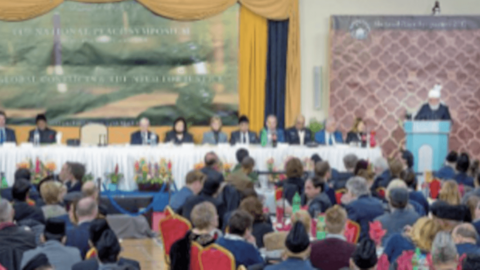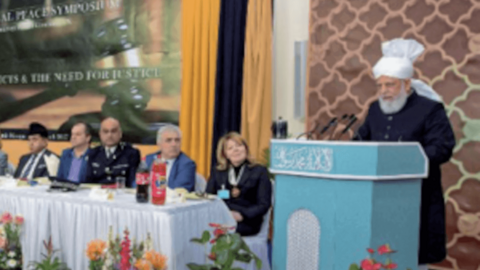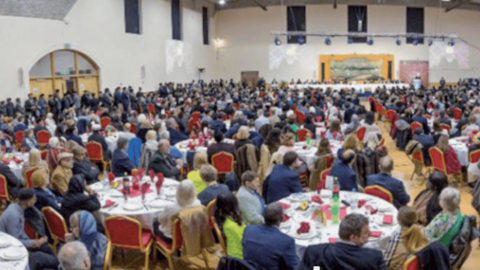Does religion spill blood (II)?
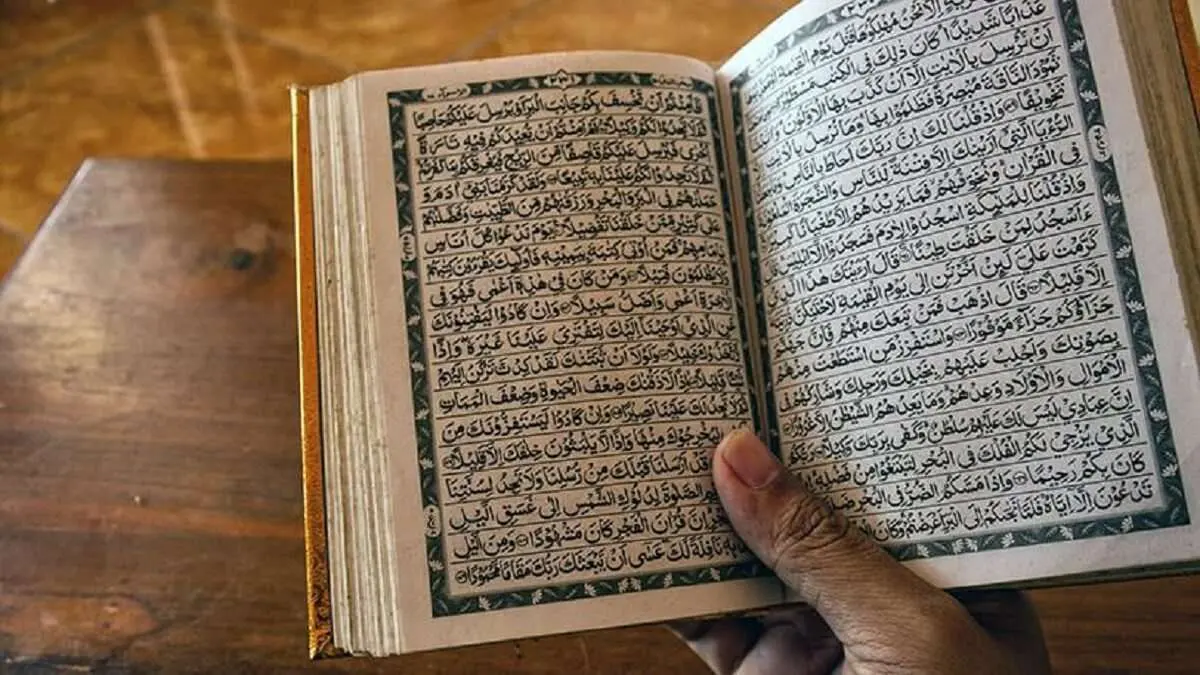
(Excerpt from the book ‘Murder in the Name of God’ by Hazrat Mirza Tahir Ahmad, 4th Supreme Khalifa of the International Ahmadiyya Community of Islam)
[This installment is a continuation of the previous one: RELIGION SPILLS BLOOD (I)].
There is also in The Quran the story of the people of the catacombs. These Christians were persecuted for 300 years and I have seen the places where these poor people were tortured, the amphitheatres used for gladiatorial combats with bulls and lions. In these arenas, defenceless Christians were thrown to hungry beasts. The animals, howling, would take the helpless Christians to task. Sometimes these ‘apostates’ were faced with unfed bulls for several days. These hungry beasts bellowed and mooed and attacked with hissing howls. The Christians were gored and trampled to death. And after this bloody festival, the Romans returned home happy and smiling. The ‘apostates’ had been suitably punished. But while the legs of the Christians trembled, their hearts beat even more strongly in faith in God.
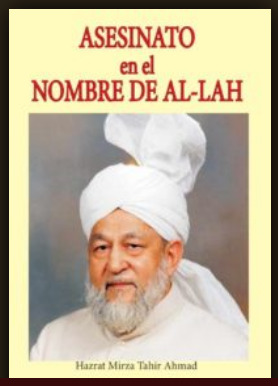
These persecutions continued intermittently for three centuries and, when they found no place of refuge, they disappeared underground into the catacombs. These long labyrinths still exist today, and remind us that Christians could live among insects, scorpions and snakes, but not with elegant religious leaders. The Quran not only mentions these people who took refuge underground - Ashabi Kahf - but also other Christians, who believed in the Oneness of God and were burnt alive as punishment.
The enormity of these atrocities is made worse by the so-called religious protectors, who actually ‘prevent’ the worship of Al'lah. Their victims are more distressed by the prohibition to worship their God than by the torture itself. The Quran says: ‘And is there anyone more unjust than he who forbids the name of Al'lah to be glorified in the temples of Al'lah and seeks their ruin?’ (2.115) Thus the Quran totally rejects the use of force to suppress religious freedom and declares that even if such suppression takes place, true believers never use force to preach in the name of Al'lah.
The first Muslims were abandoned to the scorching sun. Hot stones were put on their chests; they were dragged through the streets of Mecca like dead animals. They were isolated and condemned to die of hunger and thirst. They were thrown into dungeons, stripped of their belongings and their families were dispersed. Pregnant women were thrown from camels, their inevitable deaths a cause for rejoicing. Their corpses were cut to pieces and even the liver of the Prophet's (lpbD) uncle was eaten. They were hacked to pieces with swords and pierced with arrows. Ruffians and vagabonds stoned the Prophet (lpbD) and rogues chased and stoned him until the pebbles of Taif were stained red with his blood. And on the battlefield of Uhud, the Prophet (lpbD) was severely wounded.
This slaughter took place in the name of religion because the Muslims said ‘RabbunAl'laha’, ‘our Lord is Al'lah’. The persecution and torture were perpetrated in the name of religion because, according to the polytheists in Mecca, the Prophet (lpbD) and the Muslims were apostates. The polytheists called the Prophet (lpbD) and his followers ‘Sabi’, people who abandon their ancestral religion and adopt a new one. To destroy this ‘evil’, the Meccans adopted the methods of torture and repression that had been used by their predecessors. Muhammad (lpbD) and his followers suffered patiently and bravely for a long time to prove that evil is caused by the anti-religious people and not by the followers of the truth.
The Prophet (lpbD), exalted by Al'lah to an unparalleled position, returned to his persecutors unsurpassed love, mercy and forgiveness in return for their evil. When victory finally came and the Prophet (lpbD) overpowered the polytheists of Mecca, he ordered a general amnesty. There was no massacre and no punishment for their persecutors. There were no arrests. No one was executed. Instead of just punishment, what the Quran proclaimed was applied: ‘Let no reprisal be taken against you this day; may Al'lah forgive you. He is the most merciful of the merciful’.
On that day the cruelest of the cruel were forgiven. Mercy was shown to those who had tortured defenceless slaves in the burning arena. Those who had dragged Muslims through the streets like dead animals were absolved. Leniency was shown to those who had broken the peace, as well as to those who had stoned helpless Muslims, including the woman who had eaten the liver of the Prophet's (lpbD) uncle.
If the history of the world from Adam (lpbD) to the present day had ever been lost, and with it, the record of all persecutions and all declarations of human rights, a glance at the life of the Prophet (lpbD) would be the best demonstration that true religion is not the cause of hatred, persecution, repression or suppression of thought.
But the Prophet (lpbD) did not limit his teachings to calling for religious tolerance. Since the Prophet of Islam (lpbD) is ‘A mercy to all people’ (21.108), The Quran makes a general statement: ‘There should be no compulsion in religion’. Coercion is unnecessary because ‘Verily, the right has been separated from the wrong’ (2.257) and there is no possibility of confusing the two terms. At first glance this statement seems unusual and anomalous. On the one hand there was an arbitrary authority bent on annihilating with every means at its disposal a small group because of their ‘apostasy’, and when this group of ‘apostates’ came to power, the Quran was said to state that:
There should be no compulsion in religion. Verily the right has been separated from the wrong; so whoever refuses to be led by the sinners, and believes in Al'lah, has safely grasped a strong grip, which has no cracks (2.257).
People who persecute in the name of religion are totally ignorant of its essence. Religion is a metamorphosis of hearts. It is not politics and its adherents do not constitute political parties. It is not a nationality with limited loyalties, nor a country with geographical boundaries. It is the transformation of hearts, transformation for the good of the soul. The home of religion is in the depths of the heart. It resides beyond the domain of the sword. Mountains are not moved by the sword nor hearts changed by force. While the repetitive theme in the history of human aggression is persecution in the name of religion, the repetitive theme of The Quran is freedom of conscience.
The Prophet (lpbD) was induced again and again to proclaim: ‘It is the truth of your Lord, therefore whoever will believe let him believe, and whoever will not believe let him disbelieve’ (18.30). Truth is obviously a matter of the heart; it has nothing to do with force. It has been confirmed that it cannot be erased by any power. Hence the Quran's assertion that, once the truth is known, it is our choice to accept or reject it. However, on the other hand, The Quran says: ‘Verily this is a Reminder. So whoever wishes may take the path that leads to his Lord’ (76.30). No charter of human rights can surpass the clarity of the Qur'anic phrase ‘Faman Shaa’ (whosoever wills). The words ‘whosoever’ include everyone. It is astonishing that after such a clear statement anyone could think that Islam supports the use of force.
(lpbD) - peace and blessings of God be upon him.
(lpd) - peace be upon him.
(We will continue this discourse in the next installment: ‘DOES RELIGION SPILL BLOOD (III)?’


